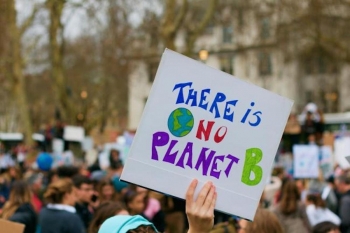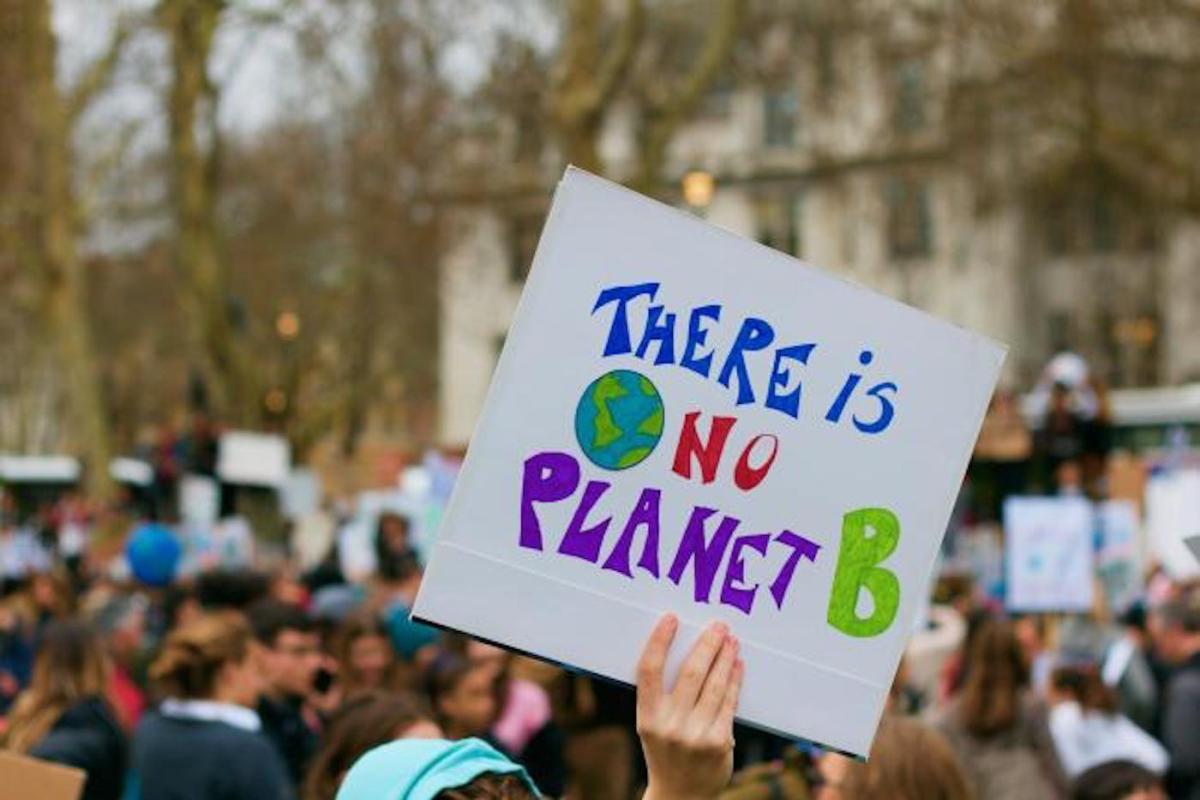
.jpg) Acharyasri Dr. Sachidananda Bharathi
Acharyasri Dr. Sachidananda Bharathi

The occasion of the Conference of Parties (COP26) on Climate control in Glasgow, Scotland, in November 2021, was an amazing opportunity as people from almost 200 countries gathered to discuss the urgent climate crisis and to negotiate solutions. I was able to attend this conference as part of a delegation representing the Society of Jesus and Ignatian collaborators. I am a member of Christian Life Community, a lay Ignatian association in over 70 countries, which has a commitment to work for the integrity of all creation. As I reflected on my experience of COP26, I realized that there was a common word for both my desolation and my consolation. That word was Fragility.
Here are some of my desolations:
Fragile. At multiple events, both at the COP26 venue as well as at side events outside in the city of Glasgow, it was heartbreaking to hear the stories and see the images of so many fragile situations due to climate change and injustice: desertification of land, decreasing number of wetlands, dying coral reefs, deforestation in impoverished areas, damaged coastal areas, ruined farms and harvests, and much more.
Rising. In presentations and discussions everywhere, rising temperatures are causing unprecedented devastation. There’s drought, famine, increased incidence of wildfires, rising sea levels, hurricanes, flooding, and tornadoes. The scale of resulting poverty, hunger, fear, violence, death, and more is enormous. Demonstrators held posters and chanted, “Keep 1.5áµ’C Alive!” It was meant for global leaders, businesses, and citizens to prevent the average global temperature from rising more than 1.5áµ’C by the year 2100.
Anger. Anger at the leaders who persist in denial or outright lies about climate change; they implement destructive policies; there is a lack of care for the common good, and a lack of integrity and will to do the right thing.
Greed. Greed for money and power is a fundamental root cause of the climate crisis. The taking, using, and polluting of natural resources disproportionally for personal gain and not considering the negative impacts on others – this is such a source of sorrow. I wondered about the basis of this greed. Is it based on fear? Fear of not having enough? Lack of trust in the dynamic that in giving of ourselves, we reap even more fullness of life. One of the Gospel readings that week was about the birds of the air and the lilies of the field. God’s creation is wonderfully abundant, nourishing, and life-giving for all, if we take care of it and share goods fairly.
Inequality. The theme of Inequality came up often in many presentations. The poorer and more vulnerable countries do not have the resources to be as influential and to negotiate just compensation for damages and loss experienced due to climate change not even of their own making. Marginalized groups such as indigenous voices face similar inequality. Many were not even able to attend the COP26 because of Covid restrictions. But for those that were there, the structure of the negotiations did not give them an equal voice at the negotiating table even for decisions directly impacting them.
Loss. With climate change causing extreme weather conditions, millions of people face loss of their homes and even cultures as they are forced to relocate. Additionally, there is loss of habitat for many creatures and loss of biodiversity with the extinction of so many more animals, insects, and plants.
Inadequate. The final pledges do not address the needed change. Multiple analysts predict that the current national pledges place the temperature rise between 2áµ’ and 3áµ’C, and that’s only if pledge agreements are enacted.
Yackety Yak! Similar to “Blah, Blah, Blah” expressed by Greta Thunberg, the Yackety Yak were the empty statements and greenwashing of national and corporate leaders expressing how wonderful their efforts are knowing full well that they fall far short of the global goals.
As dismal as the above desolations are, there were points of hope and consolation.
Fragility is a gift. Each of us alone may be a fragile voice, overwhelmed, but joining with others, our voices are strengthened. We experienced this at the Climate March! I joined a pilgrimage with the Jesuit Missions of about twenty people from Edinburgh to Glasgow. We arrived at St. Aloysius parish, and with about 100 parishioners, we walked to Kelvingrove Park where we joined thousands of people with the faith bloc. Then this block joined the March with many more blocs so that we were 100,000 marching with a clear, singular message to COP26 negotiators to do the right thing and to do what is needed to protect our planet and one another! It was an amazing witness! For Christians, this is the time of year when we reflect on the birth of Jesus Christ who was born as a fragile baby to poor parents in a very fragile situation without a place for Mary to give birth. In this story, we see how God is present and works joy and wonder into the fragility of life.
Rejoice. On the pilgrimage from Edinburgh to Glasgow, we had the opportunity to walk along the canal and the Scottish countryside. Immersed in this beautiful place, all the pilgrims had a sense of the wonder of God’s creation. With the psalmist, we could appreciate the phrase: Let ALL the Earth Rejoice. In our evening reflections, I as well as the others felt the growing desire that ALL should experience such wonder in creation, so that ALL the Earth could Rejoice.
Acknowledging our shame. At the COP26 Delegates Mass in Glasgow, the bishop stunned the congregation with the statement, “We should hang our heads in shame. Caring for our common home is a commission given to us by God.” As shocking as this was, I felt consolation! For me, it was refreshing to hear the bishop openly acknowledge our negligence and complicity in destructive practices. While not commonly done, acknowledging shame, our sins, is a necessary step for conversion toward caring, responsible, sustainable action.
God walks with us step by step. This became a mantra for me on the pilgrimage, especially as my feet became blistered and sore, and again during the conference itself in trying to figure out venues and presentations. But it also applies for us as communities figuring out next steps in this climate crisis. God is near and walks with us in our uncertainty and loss.
Indigenous voices. Good to hear the indigenous voices from five continents speaking up in various presentation and sharing their wisdom and concerns.
Loving and caring friendships. There was a strong feeling of love among people united in the desire to give witness to the need for humanity to come together and advocate for climate justice. People who were complete strangers. When facing trials, injustices, sorrow, fear – love overcomes.
Innovation. On displays throughout the venue were lots of creative ideas to help prevent, adapt, and mitigate impacts of climate change
Youth. Youth were a strong presence at COP26 with many speaking out strongly and articulately. Well-organized and creative, youth demonstrators expressed that the status quo is NOT OK. When many of us older folk were tired, or became complacent, the youth continued to organize and persist with much energy. And even as they understood the depth of the climate change problems, they continued to laugh and sing. Among my group of pilgrims at the March, they sang, “Walk in the Light!” This was a profound sense of Hope.
May we all walk in the Light so that ALL the Earth can rejoice!